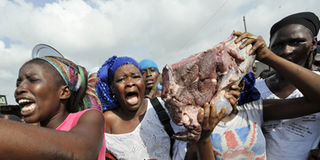Breaking News: At least 10 feared to have drowned in Makueni river
UN recognises Ouattara’s envoy as Angola warns over row

Women hold a piece of meat during a demonstration against violence and killings in the Abattoir (slaughterhouse) neighborhood, in Abidjan on December 22, 2010. Ivory Coast's deadly political stand-off escalated on Wednesday after a defiant Laurent Gbagbo insisted he is the one true president and his besieged rivals refused once again to talk with him. AFP PHOTO/ SIA KAMBOU
UNITED NATIONS, Thursday
The United Nations recognised Alassane Ouattara’s ambassador on Wednesday in a further boost to the internationally recognised victor of Cote d’Ivoire’s disputed presidential poll, diplomats said.
The UN credentials committee recognised Mr Youssouf Bamba and his delegation by consensus, and the General Assembly was expected to endorse the move in a routine vote at a plenary session today, they said.
It marked the latest move by the international community to pressure incumbent Laurent Gbagbo, who also claims to have won the election, to leave office as tensions mounted in the west African country.
Both Russia and China sit on the General Assembly’s Credentials Committee and went along with the decision to recognise Mr Bamba, pointing to a virtual consensus on the election among great powers.
The former Cote d’Ivoire ambassador to the UN Alcide Djedje had left several weeks ago and was with Gbagbo’s inner circle in Abidjan.
Meanwhile, Angola said on Wednesday the international community should not interfere in the post-election standoff in Cote d’Ivoire, and extreme positions and a bloodbath must be avoided.
“Taking extreme positions could make more difficult the possibility of peace in that country,” Angolan Foreign Minister Jorge Chicote said during a visit to Guinea Bissau.
“Angola has a position which is the respect of the institutions of the Republic of the Ivory Coast, no external interference and the adoption of a position which avoids a bloodbath in Ivory Coast,” he said.
In Washington, the US said yesterday it is talking with regional African countries about boosting UN troops in Cote d’Ivoire as part of efforts to force Mr Gbagbo to leave office.
US officials said any move to increase the 10,000-strong UNOCI peacekeeping force would not be aimed at deposing Mr Gbagbo but at deterring him from using his own forces to stay in power.
The United States and the European Union have already imposed travel restrictions on Mr Gbagbo, his family and top aides to force them to hand power to Mr Ouattara following disputed November 28 elections.
The US, EU, and the Economic Community of West African States (ECOWAS) have all recognised Ouattara as the winner of the elections and called on Gbagbo to step down immediately. ECOWAS also suspended Cote d’Ivoire as a member.
“We are in discussions with other regional countries to see if there are ways in which we can reinforce the UN peacekeeping force,” State Department spokesman Philip Crowley told reporters.
“We’re talking to a number of countries within ECOWAS,” he said without elaborating. Mr Crowley said the talks were taking place at United Nations headquarters in New York and at ECOWAS headquarters in Abuja, Nigeria.
“Other countries like France are in position to play a supporting role, as well,” he said. France, the former colonial power, is “in a position to help determine what can be done to make sure that there are adequate forces in Cote D’Ivoire to maintain peace and security,” he said.
Meanwhile, Mr Ouattara’s prime minister called today for the International Criminal Court to send a mission to Cote d’Ivoire to prosecute crimes during the deadly political stand-off.
“We’re waiting for the ICC to be able to send a mission to Ivory Coast, establish individuals’ responsibility and for all those involved in any way to be transferred to The Hague,” Guillaume Soro told




